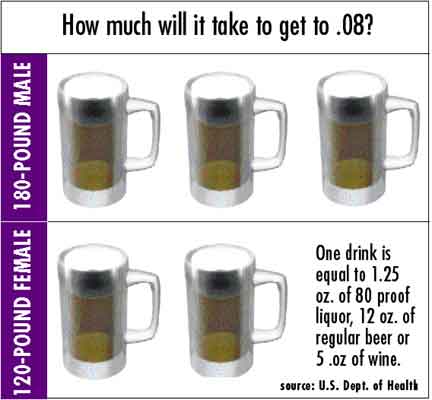A Louisiana law passed two years ago goes into effect Tuesday, lowering the legal blood alcohol level for drunk driving from .10 to .08 percent.
LSUPD Capt. Ricky Adams said campus police hand out about 10 DWI’s per month, most of which are to students under 21 whose maximum blood alcohol level is .02 according to Louisiana law.
“The .08 is significant because it is a lower blood alcohol requirement for officers to prove,” Adams said. “But around here it won’t bother those under 21 because their limit is .02.”
Louisiana now joins other states such as Alabama, New Mexico, California, New Hampshire and North Carolina in lowering the maximum blood alcohol level to keep federal highway funding, according to drivesober.com.
Adams said he expected a slight increase in the number of DWI’s on campus starting Tuesday because of the new standards.
“Our officers are trained in the detection of impaired drivers,” Adams said. “Someone arrested by LSU police will be processed and have to appear in state court just like everybody else.”
Many students said they didn’t think habits would change because of the lower standard.
Mark Ponter, a biochemistry and political science senior who is older than 21, said he goes out once a week with a group that usually has a designated driver.
“It seems like not too many people pay attention to the limit as it is,” Ponter said. “It’s kind of an abstract limit. No one is going to say ‘Well, now I’ve had two beers, I’m over the limit.'”
Lacey White, a marketing sophomore, said she doesn’t drink and drive so the change will not affect her when she goes out to bars.
“Personally, I don’t know if kids are going to watch it more because they changed the limit,” White said. “I’ve had a friend killed by a drunk driver, so it’s different after you know someone and have been affected by it.”
Gabe Boucvalt, a petroleum engineering freshman, said that after someone starts drinking, the law doesn’t really matter.
“If you drink two beers and get pulled over 10 minutes later, you’re gone,” Boucvalt said. “It’s the same as drinking 10 beers over two hours; you’re still over the limit.”
The new law covers other ways of driving while impaired, including both prescription and nonprescription drugs in DWI charges.
“As an officer’s training increases, the ability to detect alcohol and other substances gets better,” Adams said. “Now we can charge someone for being behind the wheel no matter what.”
Adams said he thought the new rules would decrease the car accident and fatality rate in the state.
According to the Baton Rouge Advocate, during the year ending Aug. 31, state police arrested 10,190 people for driving while intoxicated. Troopers also investigated 518 fatal crashes and estimate that 48 percent were alcohol-related.
Lowering the Limit
September 30, 2003

Lowering the Limit



